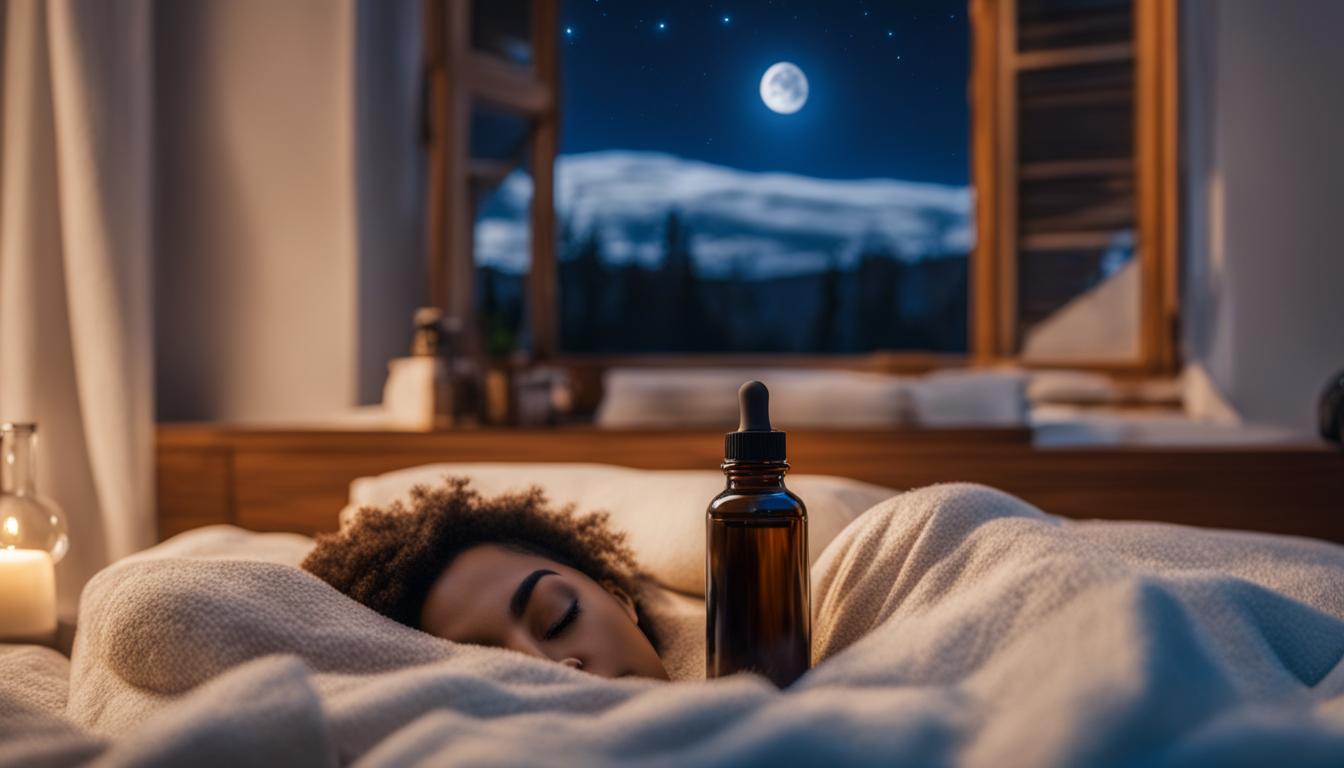Combat Sleeplessness Effectively with CBD: Your Guide to Better Rest
Welcome to our comprehensive guide on using CBD as a natural remedy for sleeplessness. If you're struggling to get a good night's sleep, CBD may offer a potential solution. CBD, or cannabidiol, is a compound derived from the Cannabis sativa plant that has gained popularity for its calming and relaxing effects. While CBD is commonly used for pain and anxiety relief, research suggests that it can also be effective in promoting better sleep.
Before we dive into the benefits and usage of CBD for sleep improvement, it's important to note that the regulation of CBD in the United States is limited. However, preliminary studies indicate that CBD can help with various sleep disorders, including insomnia. As with any new supplement, it's crucial to consult with a healthcare professional before incorporating CBD into your sleep routine, especially if you have underlying medical conditions or are taking medications.
Key Takeaways:
- CBD, derived from the Cannabis sativa plant, is being explored for its potential in improving sleep.
- The regulation of CBD in the United States is limited, so it's essential to consult with a healthcare professional before using CBD for sleep.
- Preliminary research suggests that CBD can help with various sleep disorders, including insomnia.
- Using CBD as a sleep aid may provide a more natural alternative to traditional sleep aids.
- Proper dosing and quality assurance are crucial when using CBD for sleep improvement.
The Importance of Sleep for Overall Health and Wellbeing
Getting a good night's sleep is crucial for overall health and wellbeing. Sleep plays a vital role in various aspects of our physical and mental health, including memory formation, muscle repair, and sickness prevention. When we consistently fail to get enough restful sleep, it can negatively impact our overall quality of life and lead to a wide range of health problems.
During sleep, our brains consolidate and organize information, helping us retain and recall memories. It is during this restful state that our bodies also undergo important processes, such as repairing damaged tissues and releasing growth hormones. Additionally, sleep plays a critical role in supporting our immune system, helping to fight off infections and reduce the risk of chronic illnesses, including heart disease, diabetes, and obesity.
On the other hand, chronic sleep deprivation can have detrimental effects on our health. Lack of sleep has been linked to cognitive impairments, including decreased attention, concentration, and problem-solving abilities. It can also weaken our immune system, making us more susceptible to infections and illnesses. Furthermore, inadequate sleep has been associated with an increased risk of developing chronic conditions, such as high blood pressure, diabetes, and mood disorders.
It is clear that prioritizing restful sleep is essential for our overall health and wellbeing. By adopting healthy sleep habits, such as maintaining a consistent sleep schedule, creating a comfortable sleep environment, and practicing relaxation techniques, we can improve the quality and duration of our sleep. In the next section, we will explore the potential of CBD as a natural remedy to help combat sleeplessness and promote better rest.
The Importance of Sleep for Overall Health and Wellbeing
Getting a good night's sleep is crucial for overall health and wellbeing. Sleep plays a vital role in various aspects of our physical and mental health, including memory formation, muscle repair, and sickness prevention. When we consistently fail to get enough restful sleep, it can negatively impact our overall quality of life and lead to a wide range of health problems.
During sleep, our brains consolidate and organize information, helping us retain and recall memories. It is during this restful state that our bodies also undergo important processes, such as repairing damaged tissues and releasing growth hormones. Additionally, sleep plays a critical role in supporting our immune system, helping to fight off infections and reduce the risk of chronic illnesses, including heart disease, diabetes, and obesity.
On the other hand, chronic sleep deprivation can have detrimental effects on our health. Lack of sleep has been linked to cognitive impairments, including decreased attention, concentration, and problem-solving abilities. It can also weaken our immune system, making us more susceptible to infections and illnesses. Furthermore, inadequate sleep has been associated with an increased risk of developing chronic conditions, such as high blood pressure, diabetes, and mood disorders.
It is clear that prioritizing restful sleep is essential for our overall health and wellbeing. By adopting healthy sleep habits, such as maintaining a consistent sleep schedule, creating a comfortable sleep environment, and practicing relaxation techniques, we can improve the quality and duration of our sleep. In the next section, we will explore the potential of CBD as a natural remedy to help combat sleeplessness and promote better rest.
The Importance of Sleep for Overall Health and Wellbeing
Getting a good night's sleep is crucial for overall health and wellbeing. Sleep plays a vital role in various aspects of our physical and mental health, including memory formation, muscle repair, and sickness prevention. When we consistently fail to get enough restful sleep, it can negatively impact our overall quality of life and lead to a wide range of health problems.
During sleep, our brains consolidate and organize information, helping us retain and recall memories. It is during this restful state that our bodies also undergo important processes, such as repairing damaged tissues and releasing growth hormones. Additionally, sleep plays a critical role in supporting our immune system, helping to fight off infections and reduce the risk of chronic illnesses, including heart disease, diabetes, and obesity.
On the other hand, chronic sleep deprivation can have detrimental effects on our health. Lack of sleep has been linked to cognitive impairments, including decreased attention, concentration, and problem-solving abilities. It can also weaken our immune system, making us more susceptible to infections and illnesses. Furthermore, inadequate sleep has been associated with an increased risk of developing chronic conditions, such as high blood pressure, diabetes, and mood disorders.
It is clear that prioritizing restful sleep is essential for our overall health and wellbeing. By adopting healthy sleep habits, such as maintaining a consistent sleep schedule, creating a comfortable sleep environment, and practicing relaxation techniques, we can improve the quality and duration of our sleep. In the next section, we will explore the potential of CBD as a natural remedy to help combat sleeplessness and promote better rest.
| Benefits of a Good Night's Sleep | Sleep and Overall Health |
|---|---|
| Restores energy levels | Supports immune system function |
| Enhances cognitive function | Reduces the risk of chronic diseases |
| Improves memory and learning | Regulates hormone production |
| Stabilizes mood and emotions | Promotes healthy weight management |
| Facilitates muscle repair and growth | Boosts overall productivity and performance |
Understanding CBD and its Regulation
In this section, we will delve into the world of CBD, exploring what it is, how it is regulated, and its key distinctions from other cannabis compounds.
CBD Explained: CBD, short for cannabidiol, is a compound found in the Cannabis sativa plant. Unlike THC, another well-known cannabinoid, CBD does not have psychoactive properties and does not cause a “high.” CBD has gained popularity for its potential therapeutic effects, including its use as a sleep aid.
Hemp vs Marijuana: CBD can be derived from both hemp and marijuana plants. Hemp contains less than 0.3% THC, making it legal in the United States. Marijuana, on the other hand, has higher levels of THC, which is still classified as a controlled substance in many states. It is important to note that CBD products derived from marijuana may contain higher levels of THC than reported on the label, potentially leading to unwanted psychoactive effects.
FDA Regulation of CBD: The regulation of CBD in the United States is currently limited. While the FDA has approved CBD-based medication, such as Epidiolex, for the treatment of epilepsy, most CBD products on the market are not FDA-approved. This means that the quality and consistency of CBD products can vary significantly. It is crucial to choose reputable brands that conduct third-party lab testing to ensure the safety and effectiveness of the CBD products you use.
Key Takeaways:
- CBD is a compound found in the Cannabis sativa plant, known for its potential therapeutic effects.
- It can be derived from both hemp and marijuana, with hemp being legal in the United States due to its low THC content.
- The FDA has limited regulation over CBD products, and consumers must exercise caution when choosing and using CBD products.
Now that we have a better understanding of CBD and its regulation, let's explore its potential impact on sleep in the next section.
The Effects of CBD on Sleep
Research on the effects of CBD on sleep is still limited, but preliminary studies suggest that CBD may have a positive impact on sleep quality and help with sleep disorders, including insomnia. CBD, or cannabidiol, has a calming effect on the nervous system, which can help reduce anxiety and promote relaxation, leading to improved sleep. However, it is important to note that the exact effects of CBD on sleep can vary among individuals.
One study published in the journal Medicines found that CBD improved sleep in individuals with anxiety-induced sleeplessness. The participants reported reduced anxiety levels and improved sleep quality after taking CBD. Another study published in the Permanente Journal examined the effects of CBD on individuals with insomnia and anxiety. The researchers found that CBD improved sleep in the majority of participants and reduced anxiety symptoms.
The Impact of CBD on Sleep Quality
CBD may have a direct impact on sleep quality by reducing sleep disturbances and increasing sleep duration. A study published in the Frontiers in Pharmacology journal investigated the effects of CBD on individuals with Parkinson's disease and REM sleep behavior disorder, a condition characterized by acting out dreams during sleep. The researchers found that CBD significantly reduced the frequency of REM sleep behavior disorder episodes and improved overall sleep quality.
| Study | Participants | Findings |
|---|---|---|
| Medicines | Individuals with anxiety-induced sleeplessness | Improved sleep quality and reduced anxiety levels |
| Permanente Journal | Individuals with insomnia and anxiety | Improved sleep and reduced anxiety symptoms |
| Frontiers in Pharmacology | Individuals with Parkinson's disease and REM sleep behavior disorder | Reduced frequency of REM sleep behavior disorder episodes and improved sleep quality |
While these studies indicate the potential benefits of CBD for sleep, it is important to note that more research is needed to fully understand the mechanisms and optimal dosing for different sleep disorders. Additionally, individual responses to CBD may vary, and it is advisable to start with a low dose and gradually increase as needed to find the optimal dosage for improving sleep.
In summary, preliminary research suggests that CBD may have positive effects on sleep quality and help with sleep disorders. CBD's calming effect on the nervous system can reduce anxiety and promote relaxation, potentially improving sleep. However, further research is needed to fully understand CBD's effectiveness and optimal usage for different sleep disorders. If you are considering using CBD for sleep, it is recommended to consult with a healthcare professional and choose reputable CBD products to ensure safe and responsible use.
Using CBD as a Sleep Aid
When it comes to using CBD as a sleep aid, there are various factors to consider, including dosing, administration methods, product selection, and safety. Finding the right CBD dosage for sleep can be a personal journey, as it depends on individual needs and sensitivities. It is generally recommended to start with a low dose and gradually increase until the desired effects are achieved. CBD dosing for sleep can range from 10-100 mg per day, but it is important to consult with a healthcare professional to determine the appropriate dosage for your specific situation.
There is a wide range of CBD products for sleep available on the market, including oral sprays, oils, vapes, edibles, pills, capsules, and topical solutions. Each administration method may have different absorption rates and onset times, so it's important to choose a method that aligns with your preferences and needs. For example, if you prefer faster-acting effects, vaping or sublingual oils may be more suitable, while edibles or capsules can provide longer-lasting relief.
When selecting CBD products for sleep, it is essential to prioritize quality and safety. Look for reputable brands that provide third-party lab testing to ensure the accuracy of their CBD content and verify that the product is free from contaminants. It is also crucial to consider the CBD safety and potential interactions with any medications you may be taking. Consulting with a healthcare professional can help you navigate any concerns or potential risks associated with CBD use.
| Administration Method | Onset Time | Duration of Effects |
|---|---|---|
| Vaping | Immediate | 2-3 hours |
| Sublingual (Oil or Spray) | 15-30 minutes | 4-6 hours |
| Edibles | 30 minutes – 2 hours | 6-8 hours |
| Capsules/Pills | 30 minutes – 2 hours | 6-8 hours |
| Topicals | Varies | Varies |
As with any supplement or medication, it is important to listen to your body and adjust your CBD dosage and administration method as needed. Keep track of your sleep patterns and any changes you experience to find the most effective approach for your individual sleep needs. Remember, CBD is not a cure-all solution for sleep issues, and adopting good sleep hygiene practices, such as maintaining a consistent sleep schedule and creating a relaxing bedtime routine, can also contribute to better sleep.
Research and Evidence on CBD for Sleep
While research on CBD for sleep is still limited, preliminary studies and anecdotal evidence suggest that CBD may have potential in improving sleep quality. Some studies have explored the effects of CBD combined with THC for sleep disorders such as insomnia, sleep apnea, restless legs syndrome, and nightmares associated with post-traumatic stress disorder (PTSD). These studies have demonstrated promising results, indicating that CBD may help alleviate sleep disturbances and promote better rest.
For example, a 2019 clinical trial published in The Permanente Journal investigated the effects of CBD on anxiety and sleep. The study found that CBD treatment resulted in decreased anxiety scores and improved sleep scores for the majority of participants. Another study published in 2018 in Frontiers in Pharmacology examined the potential of CBD as a treatment for insomnia. The researchers concluded that CBD may hold promise as a therapeutic option for insomnia, with minimal side effects.
Table: Clinical Studies on CBD for Sleep
| Study | Participants | Findings |
|---|---|---|
| Yang et al. (2019) | 72 individuals with anxiety or sleep problems | Significant reduction in anxiety scores and improvement in sleep scores with CBD treatment |
| Shannon et al. (2018) | 72 individuals with insomnia | Potential therapeutic effects of CBD for insomnia, with minimal side effects |
| Chagas et al. (2013) | 27 individuals with Parkinson's disease | CBD improved sleep quality and reduced REM sleep behavior disorder |
While these preliminary studies provide valuable insights into the potential benefits of CBD for sleep, more extensive and rigorous research is needed to establish its effectiveness as a standalone treatment for sleep disorders. Large-scale, placebo-controlled clinical trials are necessary to determine the optimal dosing, safety profile, and long-term effects of CBD on sleep. Additionally, further research is needed to explore the mechanisms through which CBD affects sleep and to identify specific populations that may benefit the most from CBD treatment.
Overall, while the current research on CBD for sleep is promising, it is essential to approach the topic with caution and consult with a healthcare professional before incorporating CBD into your sleep routine. Individual responses to CBD can vary, and factors such as dosage, formulation, and underlying health conditions may influence its efficacy. As the body of research on CBD continues to grow, we will gain a better understanding of its potential as a natural aid for sleep improvement.
Natural Sleep Remedies and CBD as a Sleep Supplement
When it comes to improving sleep, many people are turning to natural remedies and alternative solutions instead of traditional sleep aids. One such option that has gained popularity is CBD. CBD, or cannabidiol, is a compound derived from the Cannabis sativa plant that is believed to have calming and relaxation properties.
Compared to traditional sleep aids, CBD offers a more natural approach with fewer potential side effects. While research on the effects of CBD on sleep is still limited, early studies suggest that CBD may help improve sleep quality by reducing anxiety and promoting relaxation. This makes it a promising option for those who struggle with sleep issues.
Non-medical approaches to sleep improvement are also gaining recognition. These may include incorporating lifestyle changes such as practicing good sleep hygiene, creating a relaxing bedtime routine, and managing stress levels. Combining these non-medical approaches with the potential benefits of CBD as a sleep supplement can provide a holistic approach to achieving better sleep.
Comparing CBD to Traditional Sleep Aids
When looking at CBD as a sleep supplement, it's important to understand how it compares to traditional sleep aids. Unlike prescription medications that can have strong sedative effects and the risk of dependency, CBD offers a more gentle approach. CBD is generally well-tolerated, with minimal side effects such as drowsiness and dry mouth.
Another advantage of CBD is that it does not have the same potential for abuse as some traditional sleep aids. This makes it a safer and more appealing option for individuals seeking a natural alternative to improve their sleep quality.
While CBD shows promise as a sleep supplement, it is important to note that individual experiences may vary. Consulting with a healthcare professional is recommended, especially if you have underlying health conditions or are taking other medications. They can provide personalized guidance and help ensure that CBD is a suitable option for your specific needs.
Exploring Non-Medical Approaches to Sleep Improvement
In addition to considering CBD as a sleep supplement, adopting non-medical approaches can further enhance sleep quality. Good sleep hygiene practices are essential, such as maintaining a consistent sleep schedule, creating a comfortable sleep environment, and avoiding stimulating activities before bed.
Stress management techniques, such as meditation or deep breathing exercises, can also promote relaxation and prepare the body for sleep. Incorporating these techniques alongside CBD use can create a comprehensive approach to promoting better sleep.
| Non-Medical Approaches to Sleep Improvement | CBD as a Sleep Supplement |
|---|---|
| Consistent sleep schedule | Promotes relaxation |
| Comfortable sleep environment | Reduces anxiety |
| Avoiding stimulating activities before bed | Supports sleep quality |
| Stress management techniques | May improve sleep duration |
CBD’s Potential Benefits Beyond Sleep
While CBD is primarily known for its potential as a sleep aid, it offers a range of benefits beyond promoting better rest. Research and anecdotal evidence suggest that CBD may have positive effects on anxiety, pain relief, stress reduction, and overall wellbeing.
CBD has shown promise in alleviating anxiety symptoms, making it a potential natural remedy for those dealing with anxiety-related sleeplessness. It can help calm the nervous system and reduce feelings of stress, promoting a sense of relaxation and improving sleep quality.
In addition, CBD has been studied for its potential in providing pain relief. It can interact with the body's endocannabinoid system to help reduce inflammation and alleviate discomfort. This makes CBD a possible alternative for those looking for natural pain management solutions.
Furthermore, CBD has been found to have a positive impact on overall wellbeing. By promoting relaxation and reducing anxiety and pain, CBD can contribute to a better quality of life. It may help individuals feel more balanced, focused, and grounded, leading to improved overall physical and mental health.
Summary:
CBD offers potential benefits beyond sleep, including anxiety reduction, pain relief, stress reduction, and overall improvement in wellbeing. By calming the nervous system, CBD can help alleviate anxiety-related sleeplessness. It also shows promise in providing natural pain relief. Additionally, CBD has been found to contribute to overall wellbeing by promoting relaxation and balance. While more research is needed to fully understand the extent of CBD's benefits, it presents an intriguing option for those seeking natural alternatives for various health conditions.
CBD Safety and Responsible Use
When considering the use of CBD for sleep, it is important to prioritize safety and responsible consumption. While CBD is generally considered safe, it is crucial to consult with a healthcare professional before incorporating CBD into your sleep routine, especially if you are taking other medications. CBD has the potential to interact with certain medications, and a professional can provide guidance on any potential risks or adjustments that may be necessary.
Common side effects of CBD include drowsiness, dry mouth, and changes in appetite. It is essential to start with a low dose and gradually increase as needed, while closely monitoring for any adverse effects. This approach allows you to find the optimal dosage for your individual needs and minimize the potential for unwanted side effects.
Choosing reputable CBD products is also vital for ensuring safety and efficacy. Look for brands that prioritize third-party lab testing to verify the accuracy of CBD content and ensure that there are no harmful contaminants present. By selecting high-quality products and following proper dosage guidelines, you can confidently incorporate CBD into your sleep routine with peace of mind.
Interactions with Medications
One important consideration when using CBD is its potential interaction with other medications. CBD is metabolized by enzymes in the liver that are also responsible for metabolizing many prescription and over-the-counter drugs. This means that CBD could potentially affect how these medications are broken down and may alter their effectiveness or side effects.
If you are currently taking medications, especially those with a narrow therapeutic window or a known interaction with grapefruit, it is crucial to consult with your healthcare provider before using CBD. They can provide guidance on potential interactions and help you determine the best approach for incorporating CBD into your sleep routine while minimizing any risks.
| Interaction | Recommendation |
|---|---|
| Anticoagulants (blood thinners) | Discuss with your doctor before using CBD, as it may enhance the effects of blood-thinning medications like warfarin. |
| Antidepressants | Talk to your healthcare provider to ensure CBD will not interact with your specific antidepressant medication, as it could potentially increase or decrease its effects. |
| Benzodiazepines | CBD may increase the sedative effects of benzodiazepines, so caution should be exercised when using them together. |
| Antiepileptic drugs | Consult with your healthcare provider before using CBD if you are taking antiepileptic drugs, as it may interact with certain medications. |
| Statins | Talk to your doctor before using CBD if you are on statins, as CBD may interact with the liver enzymes responsible for metabolizing these medications. |
CBD Dosage Guidelines
When it comes to CBD dosage for sleep, it is important to start low and gradually increase as needed. The optimal dosage varies from person to person and depends on factors such as body weight, metabolism, and the specific sleep issue being addressed.
A general guideline is to start with a dosage of 10-20mg of CBD per day and assess how it affects your sleep. If needed, you can gradually increase the dosage by 5-10mg every week until you achieve the desired results. It is important to monitor how your body responds to the dosage changes and make adjustments accordingly.
It is worth mentioning that CBD products come in different strengths and concentrations. Always read the label carefully to determine the amount of CBD per serving and adjust your dosage accordingly. Consulting with a healthcare professional can provide further guidance on finding the right CBD dosage for your individual needs.
Conclusion
In summary, CBD shows promise as a potential natural remedy for improving sleep quality. Early studies and anecdotal evidence suggest that CBD may help reduce anxiety and promote relaxation, leading to better sleep. However, it is important to note that research on CBD for sleep is still limited, and more large-scale clinical trials are needed to determine its overall effectiveness.
While CBD has the potential to be an alternative to traditional sleep aids, it is crucial to consult with a healthcare professional before using CBD, especially if you are taking other medications. CBD can interact with certain drugs, and it is important to ensure safe and responsible use.
Looking ahead, future research on CBD for sleep will provide valuable insights into its effectiveness and optimal dosing for sleep disorders. As the popularity of CBD continues to grow, it is essential to prioritize scientific research to better understand its potential benefits and risks.
FAQ
What is CBD?
CBD, or cannabidiol, is a compound found in the Cannabis sativa plant. Unlike THC, CBD does not have psychoactive properties and does not cause a “high.”
Is CBD legal in the United States?
CBD can be derived from hemp, which contains less than 0.3% THC, making it legal in the United States. However, CBD regulation is limited, and only a few CBD products have been approved by the FDA for certain conditions.
Can CBD help with sleep disorders?
While research is still limited, preliminary studies suggest that CBD may help with sleep disorders, including insomnia. CBD has a calming effect on the nervous system and can reduce anxiety, which may indirectly improve sleep quality.
How should I take CBD for sleep?
CBD can be taken in various forms, such as oral sprays, oils, vapes, edibles, pills, capsules, and topical solutions. The dosing of CBD for sleep is not standardized, so it is recommended to start with a low dose and gradually increase as needed.
Is CBD safe to use for sleep?
CBD is generally considered safe, but it can interact with certain medications. It is important to consult with a healthcare professional before using CBD, especially if you are taking other medications. Common side effects of CBD include drowsiness, dry mouth, and changes in appetite.
Is CBD a natural alternative to traditional sleep aids?
CBD has gained popularity as a more natural and holistic approach to sleep improvement compared to certain medications. However, it is important to note that CBD is not a cure-all solution for sleep issues, and adopting good sleep hygiene practices and making lifestyle changes may also be necessary.
Does CBD have benefits beyond sleep?
CBD has shown promise in relieving anxiety, reducing pain, and promoting overall wellbeing. It has a calming effect on the nervous system and can help alleviate anxiety-related sleeplessness. However, more research is needed to fully understand the extent of CBD's benefits for various health conditions.
How do I ensure the safety and quality of CBD products?
It is important to choose reputable brands with third-party lab testing to ensure the safety and effectiveness of CBD products. Consulting with a healthcare professional can also help guide you in selecting the right CBD product and dosage.
What does the research say about CBD for sleep?
While research on CBD for sleep is still limited, early studies and anecdotal evidence suggest that CBD may help improve sleep quality. More large-scale, placebo-controlled clinical trials are needed to determine the effectiveness of CBD as a standalone treatment for sleep disorders.
What are the potential side effects of CBD?
Common side effects of CBD include drowsiness, dry mouth, and changes in appetite. It is recommended to start with a low dose and gradually increase as needed, while monitoring for any adverse effects.
Is CBD a cure for sleep disorders?
CBD is not a cure-all solution for sleep disorders. While it may help improve sleep quality, it is important to adopt good sleep hygiene practices and make lifestyle changes for long-term sleep improvement.
Source Links
- https://www.nytimes.com/2022/08/30/well/live/does-cbd-help-with-insomnia.html
- https://www.ncbi.nlm.nih.gov/pmc/articles/PMC6326553/
- https://www.sleepfoundation.org/sleep-aids/cbd-for-sleep











Leave a Reply